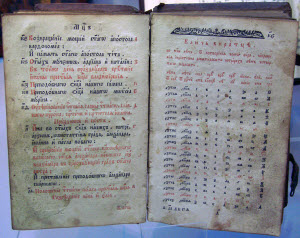
 RDINARY TIME GETS ITS NAME not because it is dull or not special, but because it is numbered. Ordinal refers to that which is numbered. Therefore, Ordinary Time is named such because it is simply the time in which we count the weeks. How strange, then, that counting is something that Ordinary Time sometimes does poorly! For example, in a few weeks, we will begin Ordinary Time again, resuming with the 10th Sunday of Ordinary Time. But wait, I thought that the last time we experienced Ordinary time was just before Lent, with the 5th Sunday! How does that work out?
RDINARY TIME GETS ITS NAME not because it is dull or not special, but because it is numbered. Ordinal refers to that which is numbered. Therefore, Ordinary Time is named such because it is simply the time in which we count the weeks. How strange, then, that counting is something that Ordinary Time sometimes does poorly! For example, in a few weeks, we will begin Ordinary Time again, resuming with the 10th Sunday of Ordinary Time. But wait, I thought that the last time we experienced Ordinary time was just before Lent, with the 5th Sunday! How does that work out?
First of all, I think it helpful to refer to the Sundays not of Ordinary Time, but in Ordinary Time. It’s a small distinction, but it helps to clarify the concept. Each individual week of Ordinary Time begins with a Sunday, but it is not always named a Sunday of Ordinary Time. For example, the first week begins with the Baptism of the Lord. Remembering this principle, and knowing that Easter Season ends with Pentecost Sunday, we can deduce that the week after Pentecost is the 6th week of Ordinary Time, the week after Trinity is the 7th week of Ordinary Time, and the week after Corpus Christi is the 8th week of Ordinary Time. Therefore, when we resume counting Sundays this year, the week after Corpus Christi (June 9) will be the…um…10th Sunday of Ordinary Time? What gives? I thought this was about counting!
This reminds me of a riddle that my grandfather used to tell me:
Three men check into a hotel. The hotel manager charges them $30, and so, splitting the bill, each man pays $10. After the men go up to their room, the manager realizes he has overcharged them; he only should have charged them $25 for the room. He gives $5 to the bellboy and tells him to go reimburse the men. The dishonest bellboy pockets $2 while he is in the elevator and only reimburses the men $3. Now, each of the men has paid $9 for the room. 9 times 3 equals 27, plus the 2 dollars that the bellboy kept equals 29. Where’s the other dollar?
The answer to this riddle, as well as the Mystery of the Missing Week of Ordinary Time, is that you’re counting it wrong. You are presented with the wrong elements of the financial math in the riddle, just as you are counting the weeks incorrectly in Ordinary Time. Indeed, Ordinary Time did leave off with the 5th Sunday just before Ash Wednesday. However, it doesn’t resume with the 6th Sunday.
The trick here is to remember two things: because Christmas occurs on a different weekday each year, then the Advent and Christmas seasons will be of varying length. The second thing to remember is that the last Sunday in Ordinary Time, Christ the King, is always on the 34th Sunday of Ordinary Time. This year, though, there are only 33, not 34, Sundays in Ordinary Time. How does the Church rectify this? Simply put, she cheats. She simply declares the last Sunday of Ordinary Time to be the 34th, and then counts backwards until she reaches Pentecost. Therefore, the week following Pentecost is the 7th, not the 6th, week in Ordinary Time. There simply skips the 6th week of Ordinary Time altogether this year. You’ve been counting it wrong.
Before you are too scandalized by this (and honestly, who isn’t scandalized by the trivialities of the Liturgical Calendar Year? Lent isn’t even 40 days! Psh!), recall that counting backwards is how we figure out almost everything in the calendar. The beginning of Advent is determined by counting backwards from Christmas, and the beginning of Lent is figured by counting backwards from Easter. Sorry everybody, you were baptized into a weird family. That’s just how we roll.
If you thought Ordinary Time was Ordinary by any definition of the word, you were wrong.

